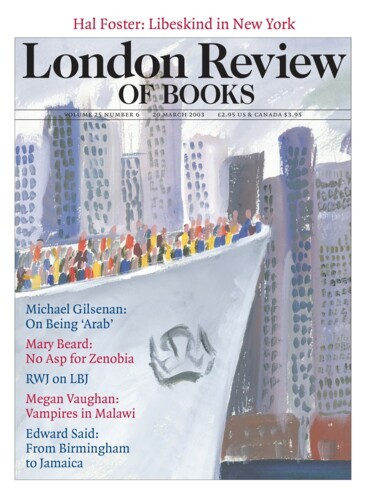Pupils at the Albert Einstein Middle School in Sacramento, California are not allowed to wear sandals without socks. Einstein himself would have been sent home to change, sandals without socks being his default footwear. On the cover of Dear Prof. Einstein: Albert Einstein’s Letters to and from Children, however, he is shown sitting cross-legged on a stoop, a benign grin on his face and a pair of fluffy slippers on his feet. The book, edited by Alice Calaprice (Prometheus, $24), is a ‘small sampling’ of letters that Einstein received from children, and some of his replies. ‘I would have written ages ago,’ a girl called Tyfanny wrote, ‘only I was not aware that you were still alive.’ In answer to Monique from New York, who asked him when the world would end, Einstein said: ‘Wait and see!’ Let’s hope we still have a while longer to wait. A small group of children, in defiance of their classmates and, presumably, their teacher, too, insisted that life on earth could survive the extinction of the sun. Who better to arbitrate than the world’s greatest living scientist? ‘The minority is sometimes right,’ Einstein replied, ‘but not in your case.’ It’s the sort of thing one occasionally feels like saying to one’s leaders.
It’s certainly the sort of thing that needs saying to the clowns of the Headmasters’ and Headmistresses’ Conference who have been so loudly complaining about university discrimination against their private-school pupils. ‘There might well be a human rights case to answer,’ an HMC spokesman told the Times Higher Education Supplement. The anecdotal evidence at the centre of the row concerns the case of a pupil from King Edward’s School in Birmingham, who is predicted to get five As at A-level. Bristol didn’t offer him a place; he’s going to Cambridge. It’s an outrage. Never mind that Bristol would have known that it was more than likely Cambridge would make him an offer, and even more likely he’d take it up, so that whether thay made an offer or not was likely to be, for want of a better word, academic. Spoilt-bastard effrontery is immune to such considerations.
‘Our business is to pick up people who are best going to profit from their time here,’ Patricia Broadfoot, the pro vice-chancellor told the THES, justifying the university’s position. ‘Research shows that students from disadvantaged backgrounds have to be more determined, more committed and more self-reliant to do well at A-level than more privileged students.’ This worthiness should be tempered by the fact that still only 60 per cent of students at Bristol are from state schools, and only 11 per cent are from working-class backgrounds, compared to a national average of 25 per cent: only the University of London, Glasgow School of Art, Cambridge and Oxford have fewer. But if anecdote rather than statistical fact is the preferred currency of the HMC, they could ask any teacher at any state school about intelligent, motivated pupils being overlooked by their first-choice universities; and I could tell them a few stories about privately educated children – I went to school with some of them – drifting and squandering their way through university and out the other side, with or without a degree to show for it (and a very nice time most of them had of it, too). Simon Heffer in the Daily Mail took up his predictable cudgel on behalf of the beleaguered privileged classes. The head of the university funding council, however, has said that Bristol’s admissions policy is ‘fair and equitable’, and even Charles Clarke has criticised the private schools’ proposed ‘boycott’ as ‘misguided’.
The facts of the matter (surprise, surprise) are quite different from what the HMC would have us believe. Between 1991-92 and 1998-99, according to a recent study by Paul Machin, director of the Centre for the Economics of Education at the Department for Education and Skills, overall participation in higher education increased by 8 per cent. Broken down socioeconomically, the figures for most backgrounds hovered around this level. Among the children of professional parents, however, university attendance increased by 17 per cent. The HMC were right about one thing: it just doesn’t seem fair.
Send Letters To:
The Editor
London Review of Books,
28 Little Russell Street
London, WC1A 2HN
letters@lrb.co.uk
Please include name, address, and a telephone number.

